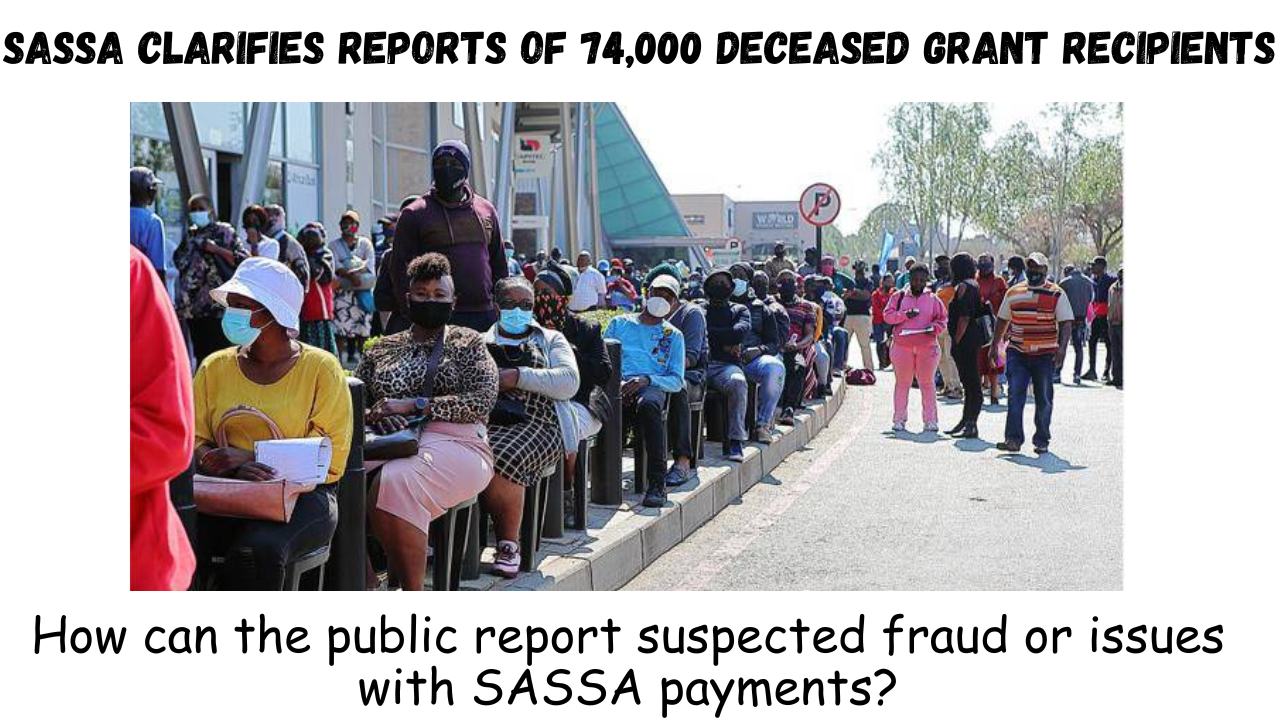SASSA Clarifies Reports of 74,000 Deceased Grant Recipients
In recent developments, the South African Social Security Agency (SASSA) has come forward to address and clarify widespread reports concerning a significant number of deceased individuals allegedly receiving grants. This issue, involving around 74,000 cases, has sparked public concern and prompted a thorough investigation by SASSA.
Reports initially surfaced from internal audits and external whistle-blowers, indicating that grants were being disbursed in the names of individuals who had passed away. This situation raised alarms about potential fraud and system inefficiencies within SASSA, leading to a public outcry for accountability and transparency.
Best Way to Contact SASSA for Payment Glitches, 2024
SASSA’s Response
In response to these alarming reports, SASSA initiated a comprehensive review of its beneficiary database. The aim was to verify the accuracy of the claims and to understand the extent of the issue. SASSA’s approach included cross-referencing beneficiary records with the national Department of Home Affairs’ death registry to identify discrepancies.
SASSA Resubmit|Sassa Status Check
Findings and Actions Taken
SASSA’s investigation revealed several critical insights:
- Verification Process: A significant portion of the reported cases were found to be due to delays in updating the beneficiary database with information from the death registry. This administrative lag led to the unintentional continuation of grant payments.
- Fraudulent Activities: A smaller, yet concerning, number of cases involved fraudulent activities, where individuals exploited the identities of deceased persons to unlawfully claim grants.
- Immediate Measures: SASSA took immediate action by halting payments to the identified deceased beneficiaries and implementing stricter verification processes to prevent future occurrences. Efforts to recover unlawfully claimed funds were also initiated.
- Long-term Solutions: To address systemic issues and enhance operational efficiency, SASSA announced plans to improve its IT systems for real-time data sharing with the Department of Home Affairs. This upgrade aims to ensure immediate updates to the beneficiary status, reducing the risk of similar issues.
- Transparency and Accountability: SASSA has committed to transparency throughout the investigation and rectification process. The agency has engaged with stakeholders, including government oversight bodies and the public, to report on its findings and the steps taken to address the issues.
SASSA Alternative Income Source Identified
Conclusion
SASSA’s proactive stance on clarifying the reports of deceased grant recipients highlights its commitment to integrity and transparency. By undertaking rigorous investigations and implementing systemic improvements, SASSA aims to strengthen its operations and restore public trust. This episode serves as a reminder of the ongoing challenges faced in managing large-scale social welfare programs and the importance of continuous monitoring and adaptation to safeguard against fraud and inefficiencies.
SASSA Pension South Africa
FAQs
How did SASSA identify the deceased grant recipients?
Through cross-referencing its database with the Department of Home Affairs’ death registry.
What measures has SASSA taken to address this issue?
SASSA halted payments, initiated fraud recovery processes, and is upgrading its IT systems for better data sharing with the Department of Home Affairs.
How can the public report suspected fraud or issues with SASSA payments?
Concerns can be reported directly to SASSA through their official contact channels, including customer service hotlines, email, and physical offices.
Certainly, adding a Frequently Asked
Q1: How did SASSA initially become aware of grants being paid to deceased individuals?
A1: SASSA became aware of this issue through internal audits and reports from external whistleblowers. These sources indicated discrepancies in payments that necessitated a thorough investigation.
Q2: What was the scale of the issue according to SASSA’s findings?
A2: The investigation pointed to reports of approximately 74,000 deceased individuals receiving grants. However, further scrutiny revealed that a significant portion of these were due to administrative delays in updating records, with a smaller fraction involving fraudulent activities.
Q3: What steps has SASSA taken to address this problem?
A3: SASSA has implemented several measures, including halting payments to the identified cases, enhancing data sharing with the Department of Home Affairs for real-time updates, and strengthening verification processes to prevent future discrepancies.
Q4: How is SASSA working to recover funds that were fraudulently claimed?
A4: SASSA has initiated recovery processes for unlawfully claimed funds. This involves legal actions against individuals who fraudulently received grants, as well as efforts to recoup the misappropriated amounts.
Q5: What can beneficiaries do to ensure their information is up-to-date and avoid similar issues?
A5: Beneficiaries are encouraged to regularly update their personal information with SASSA, including reporting any significant life changes. This helps in maintaining accurate records and ensuring the rightful disbursement of grants.
Q6: Will there be any changes to the application and verification process for new beneficiaries?
A6: Yes, SASSA is working on improving its application and verification processes to include more stringent checks and real-time data verification to minimize the risk of similar issues in the future.
Q7: How can the public report suspected fraud or discrepancies in grant payments?
A7: The public can report suspected fraud or discrepancies directly to SASSA through their official contact channels, such as customer service hotlines, emails, or by visiting local SASSA offices.
Q8: Is SASSA taking any steps to improve transparency and public trust following this issue?
A8: SASSA is committed to improving transparency by openly communicating its findings, the steps taken to address the issue, and ongoing measures to prevent future discrepancies. This includes regular updates to the public and stakeholders on its progress and any new policies implemented.
Read More

